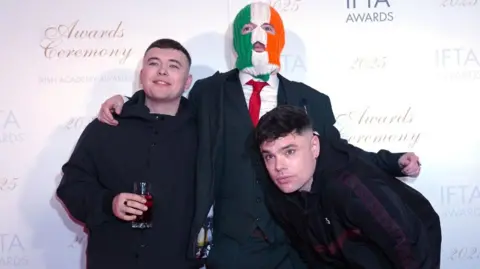In a startling turn of events, the Belfast-based rap group Kneecap has formally apologized to the families of two murdered Members of Parliament, Sir David Amess and Jo Cox. Their apology comes in the wake of a controversial performance captured on video during a concert held in November 2023. In this footage, one of the band members seemingly utters the remark: “The only good Tory is a dead Tory. Kill your local MP.” The gravity of this statement has drawn widespread condemnation and scrutiny, prompting counter-terrorism police to investigate the incident.
The fallout from Kneecap’s comments has been swift. Kemi Badenoch, the leader of the Conservative Party, has called for the group to be prosecuted for what she deems an incitement to violence. Prime Minister Sir Keir Starmer’s spokesperson also weighed in on the situation, indicating that those who express such harmful sentiments should not receive any form of government funding. This sentiment reflects a consensus among several political leaders regarding the unacceptable nature of the band’s statements.
In their subsequent statement, Kneecap refuted any interpretations suggesting they intended to incite violence. They vehemently denied allegations of promoting violence against any individual or MP, expressing that their words were taken out of context and misrepresented. Kneecap conveyed their heartfelt apologies to the families of Amess and Cox, stressing that it was never their intention to cause emotional distress.
The band’s apology comes against the background of two high-profile incidents regarding the MPs. Jo Cox was tragically murdered in June 2016, a shocking event that rippled through the UK and left an indelible mark on political discourse. Similarly, Sir David Amess was fatally stabbed in October 2021 during a constituency surgery, drawing attention to the vulnerabilities faced by politicians in public service.
Katie Amess, the daughter of Sir David Amess, voiced her outrage over Kneecap’s remarks, stating she was “gobsmacked at the stupidity” of someone publicly advocating such violent rhetoric. Her candid expression of dismay underscores the delicate balance between artistic expression and social responsibility.
Furthermore, Sir Keir Starmer’s official spokesperson reiterated the Prime Minister’s view that the band’s comments were “completely unacceptable,” emphasizing that no further public funds would be allocated to Kneecap. This decision follows a prior case in which Kneecap successfully challenged the UK government after arts funding was withdrawn, leading to a compensation payment awarded to the band last year.
The controversy surrounding Kneecap does not end with their inflammatory remarks on political figures. The Metropolitan Police are also examining another video from a November performance, in which a band member appeared to shout support for Hamas and Hezbollah, militant organizations banned in the UK. In response, Kneecap has firmly stated that they do not condone violence against civilians in any form.
Political leaders across the spectrum have condemned the incendiary language used by the band, with Irish Taoiseach Micháel Martin urging the group to clarify their statements urgently. Additionally, DUP leader Gavin Robinson labeled the band’s rhetoric as a “hatefest” and expressed the need for accountability. He indicated that there is a collective political determination, both in London and Dublin, to confront such incendiary speech.
Calls to rescind Kneecap’s participation at major music festivals, including Glastonbury, have emerged as the fallout continues to escalate. Notably, Labour MP David Taylor expressed grave concerns over the band performing at national events, representing a broader unease about the societal impact of such controversial content. In conclusion, while Kneecap has tried to navigate the backlash with an apology, the implications of their statements and the ensuing political discourse reflect a critical moment regarding free speech, artistic expression, and accountability in today’s society.



